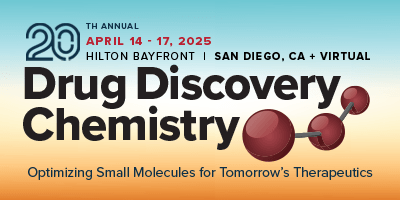2025년 트레이닝 세미나(대면만)
Cambridge Healthtech Institute의 트레이닝 세미나에서는 실제 사례 연구, 직면한 문제, 적용된 솔루션 외에 학술적인 이론과 배경에 관한 폭넓은 설명을 제공합니다. 각 트레이닝 세미나에서는 정식적 강의와 인터랙티브 디스커션 및 액티비티를 조합하여 학습 체험을 최대한 높일 수 있습니다. 이러한 트레이닝 세미나에서는 경험이 풍부한 강사가 현재 연구에 적용 가능한 내용에 초점을 맞추고, 이 분야를 처음 접하는 분들에게 중요한 가이던스를 제공합니다.
Drug Discovery Chemistry의 트레이닝 세미나는 대면으로만 제공됩니다.
2025년4월15일(화요일)오전 8:00 - 오후 3:35 | 2025년4월16일(수요일)오전 8:00 - 오후 12:00
TS6A: The Medicinal Chemistry-Pharmacology Interface: The 3 Independent SARs for New Drug Candidates
Seminar Outline:
Day 1 (AM): SAR 1: Primary Target Activity
- Affinity: What concentrations are needed in the receptor compartment for target binding?
- Efficacy: How do drugs produce cellular response (drugs have many efficacies)? How the combination of signaling effects yields a ‘quality’ of efficacy to cells.
Day 1 (PM): SAR 1: Primary Target Activity (cont.)
- Efficacy/how biased-signaling causes complex patterns of efficacy (and how can this be manipulated?).
- Allosteric vs. orthosteric interaction of molecules: how allosteric interaction fundamentally differs from orthosteric (same site) interaction.
- Kinetics of ligand interaction for in vivo target coverage: the importance of in vivo–restricted diffusion/importance of receptor offset rates for target coverage (PK-PD dissociation)/methods to measure kinetics.
Day 2 (AM): SAR 2—Pharmacokinetic Profile and SAR 3—Safety
- SAR 2 (ADME): Methods for modification of candidate ADME properties (modification of ‘druglike’ activity/specific modification of interactions with recognition processes (i.e., hepatic enzymes, transporters).
- SAR 3: Safety: Basic safety issues faced early on (cytotoxicity, hepatotoxicity, hERG, Ames test)/translation of in vitro to in vivo activity.
INSTRUCTOR BIOGRAPHIES:
 Terrence P. Kenakin, PhD, Professor, Pharmacology, University of North Carolina at Chapel Hill
Terrence P. Kenakin, PhD, Professor, Pharmacology, University of North Carolina at Chapel Hill
2025년4월16일(수요일)오후 1:30 - 5:45 | 2025년4월17일(목요일)오전 10:15 - 오후 5:40
TS6B: Drug Exposure at the Target: The Role of ADME and Pharmacokinetics
Session 1
- Drug discovery: typical order of operations
- ADME and key pharmacokinetic parameters
- Modeling Cp-time curves from an IV dose
- Modeling Cp-time curves from an oral dose
Session 2
- Oral drug space and membrane permeability
- Metabolic stability and intrinsic clearance
- Plasma, PPB, and the free drug hypothesis
- Compartment models
Session 3
- Preformulation and formulation
- Preclinical species and PBPK
- Non-small molecule drug modalities PK/PD modeling
INSTRUCTOR BIOGRAPHIES:
 Erland Stevens, PhD, James G. Martin Professor, Department of Chemistry, Davidson College
Erland Stevens, PhD, James G. Martin Professor, Department of Chemistry, Davidson College
* 주최측 사정에 따라 사전 예고없이 프로그램이 변경될 수 있습니다.
2025년 4월 14일

분해제·분자 접착제 : 종양학 너머

공유결합·근접 유도 기반 치료

생성 AI와 예측 모델링

여성 건강용 Drug Discovery

RNA 수식 저분자 의약품
2025년 4월 15 - 16일

분해제·분자 접착제 - 파트 1

프래그먼트 기반 Drug Discovery(FBDD)

조기 Drug Discovery용 AI/ML - 파트 1

GLP1·경구 펩티드

발견 화학의 신규 기술
2025년 4월 16 - 17일

분해제·분자 접착제 - 파트 2

단백질간 상호작용(PPI)

조기 Drug Discovery용 AI/ML - 파트 2

DEL(DNA-Encoded Library)

전사 인자·조절 인자의 약물 투여









